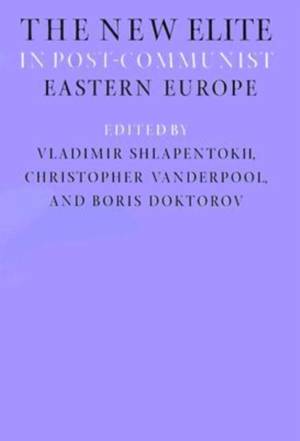
- Afhalen na 1 uur in een winkel met voorraad
- Gratis thuislevering in België vanaf € 30
- Ruim aanbod met 7 miljoen producten
- Afhalen na 1 uur in een winkel met voorraad
- Gratis thuislevering in België vanaf € 30
- Ruim aanbod met 7 miljoen producten
Zoeken
Omschrijving
With the collapse of the Soviet Union, a radical metamorphosis took place in Eastern Europe as major power structures were replaced by new systems of power and authority. With new power systems came new types of dominant elites. The New Elite in Post-Communist Eastern Europe identifies those elites who have gained control of the political, economic, cultural, and scientific institutions of the new state systems and examines the nature of power in the post-Communist world and the relationships between the old and new elite. This study of the new elite in Eastern Europe developed from a 1994 conference on the subject, attended by scholars, sociologists, representatives from major national and international government organizations, European state leaders, and those considered members of the new elite. Twenty-six of those participants have now contributed their experiences and their definitions of the new elite to this book, edited by Vladimir Shlapentokh, Christopher Vanderpool, and Boris Doktorov, resulting in a global intellectual effort to define the political and social processes of post-Communist society. The New Elite in Post-Communist Eastern Europe contains analysis from members of nearly every post-Soviet republic. Many contributors conducted direct sociological research on their respective issues, which along with polls and other data sources, developed a strong empirical base for the work. In addition to an introduction by Shlapentokh and Vanderpool, chapters appear under four main sections: "Post-Communist Elites: An Overview"; "Elites in Post-Soviet Republics"; "The Regional Elite in Russia"; and "Types of the Elite." Eastern Europe is a hotbed of unrest, revolution, and change. Understanding those who are in power is vital to understanding the countries in that region and their potential impact on global politics, economy, and society. The New Elite in Post-Communist Eastern Europe offers that understanding.
Specificaties
Betrokkenen
- Auteur(s):
- Uitgeverij:
Inhoud
- Aantal bladzijden:
- 424
- Taal:
- Engels
- Reeks:
- Reeksnummer:
- nr. 10
Eigenschappen
- Productcode (EAN):
- 9780890968956
- Verschijningsdatum:
- 1/10/1999
- Uitvoering:
- Hardcover
- Formaat:
- Genaaid
- Afmetingen:
- 166 mm x 244 mm
- Gewicht:
- 884 g

Alleen bij Standaard Boekhandel
+ 137 punten op je klantenkaart van Standaard Boekhandel
Beoordelingen
We publiceren alleen reviews die voldoen aan de voorwaarden voor reviews. Bekijk onze voorwaarden voor reviews.











